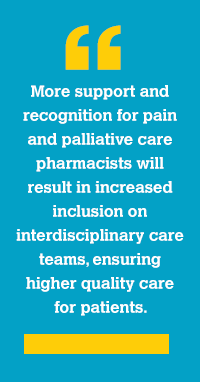
Cara M. Brock, PharmD, CPE, and President of the Society of Pain and Palliative Care Pharmacists
Following up on last month’s announcement that the Board of Pharmacy Specialties (BPS) is taking active steps toward the creation of a new specialty in Pain Management Pharmacy, AACIPM reached out to Cara M. Brock, PharmD, CPE, and President of the Society of Pain and Palliative Care Pharmacists (SPPCP) to better understand why this specialty is important for the field and, moreover, how it could improve quality care for people living with pain.
AACIPM: In the coming months, the BPS Board of Directors will move forward in determining, in detail, each of the criteria deemed necessary for the creation of a new specialty in pain management, including need, demand, specialized knowledge and functions, education and training, and transmission of knowledge.
What would a specialty in Pain Management Pharmacy mean to SPPCP and to the wider pain and palliative care community?
 SPPCP: The Society of Pain and Palliative Care Pharmacists (SPPCP) consists of pharmacist members working in acute and chronic pain management, opioid stewardship, inpatient and outpatient palliative care, and hospice settings. One of the cornerstones of the founding of SPPCP was the strong desire of our founders to unite to continue pursuing recognition of the specialty, and a call for petition is a huge step in this process, so we are excited to be a part of this effort. Given the wide range of practice settings and specialist types of our members, we are waiting for BPS to release the domains, tasks, and knowledge statements for the Pain Management Specialty that will be used to determine the content of the exam. This will allow us to have a better idea of how this exam will meet the needs of all our members.
SPPCP: The Society of Pain and Palliative Care Pharmacists (SPPCP) consists of pharmacist members working in acute and chronic pain management, opioid stewardship, inpatient and outpatient palliative care, and hospice settings. One of the cornerstones of the founding of SPPCP was the strong desire of our founders to unite to continue pursuing recognition of the specialty, and a call for petition is a huge step in this process, so we are excited to be a part of this effort. Given the wide range of practice settings and specialist types of our members, we are waiting for BPS to release the domains, tasks, and knowledge statements for the Pain Management Specialty that will be used to determine the content of the exam. This will allow us to have a better idea of how this exam will meet the needs of all our members.
AACIPM: How has SPPCP been involved with the development of this new specialty in Pain Management Pharmacy?
SPPCP: Although SPPCP was not directly involved, many of our members were selected as panelists for the BPS Pain Management Pharmacy Role Delineation Panel in early 2021. Additionally, SPPCP distributed the Pain Management Role Delineation Survey to our members and encouraged them to participate in this important step in the process. SPPCP plans to partner with other pharmacy professional organizations in the creation of the petition for recognition of the specialty. We will contribute financially and by providing clinical experts and administrative support during the creation of the petition.
AACIPM: Why did SPPCP focus on this specialty as something that was important to pursue?
 SPPCP: This was one of the reasons SPPCP was formed as an organization over five years ago. There was a strong desire for recognition of the specialty by BPS by our founders and members.
SPPCP: This was one of the reasons SPPCP was formed as an organization over five years ago. There was a strong desire for recognition of the specialty by BPS by our founders and members.
AACIPM: How do you anticipate this new specialty will affect access to quality pain care for people who need it?
SPPCP: We hope that the availability of credentialing in pain management will emphasize the importance of pharmacists as part of the patient care team regardless of practice setting. As the number of post-graduate pharmacy residencies in pain management and palliative care continues to grow, the number of pharmacy specialists trained in the specialty grows every year. More support and recognition for pain and palliative care pharmacists will result in increased inclusion on interdisciplinary care teams, ensuring higher quality care for patients. We recognize that the best patient care comes from multidisciplinary teams of specialty trained clinicians working together to care for their patients.